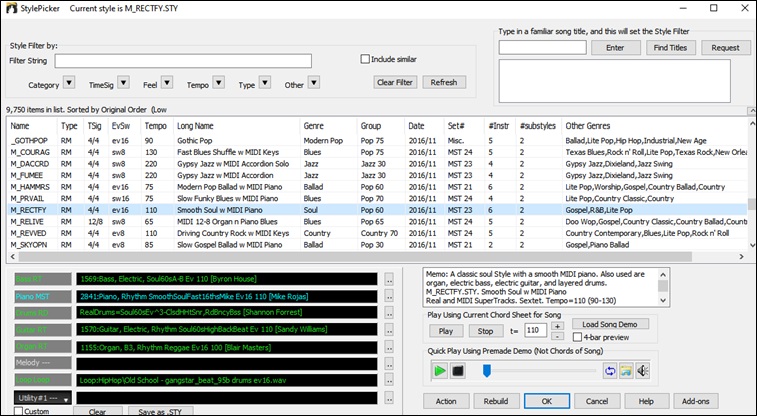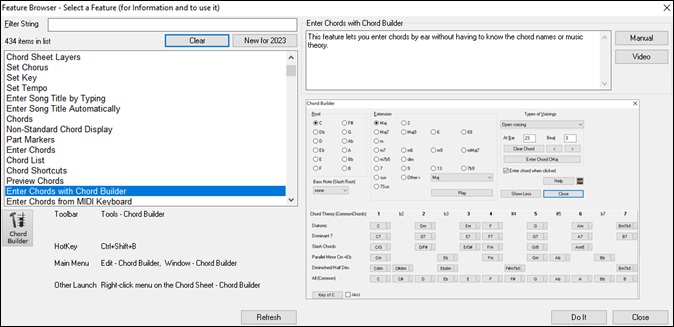Search Manual
Band-in-a-Box® 2023 for Windows® User's Guide
Chapter 2: QuickStart
Creating music with Band-in-a-Box is as easy as 1-2-3! Here’s how.
Step 1 – Typing in the Chords
There are numerous ways of entering chords into Band-in-a-Box; we will discuss the two most common methods.
1. Using the Computer Keyboard
2. Playing directly on a MIDI Controller Keyboard
On the main screen of the program, you will see an area called the Chord Sheet.

Each of the numbered cells on the Chord Sheet represents a bar. In this example, we see that there is an E chord in the first bar of this song, an A chord in bar 5, and later in the song, an E7 in bar 12. Notice the box in the first half of bar 1. This is the highlight cell, and it represents the bar you are currently working on. You can move the highlight cell around using the cursor keys or click on any bar with the mouse.
Enter Chords Using the Computer Keyboard
To enter a specific chord, move the highlight cell to where you want to place the chord. For example, to add (or change) a chord in bar 10, you would highlight bar 10 on the Chord Sheet. Next, type in your chords. If you want an A chord at bar 10, type the A key on your keyboard, and press Enter. Notice that when you use the Enter key, the highlight cell moves to the second half of the bar. You could then enter another chord at beat 3. Chords names are normally typed using standard chord symbols (like C or Fm7 or Bb7 or Bb13#9/E), but you can enter them in other chord formats like Roman Numerals, Nashville Notation, Solfeggio, and Fixed Do (popular in Italy and Europe).
Enter Chords Using a MIDI Controller Keyboard
You can enter chords from an external MIDI. Play the chord on the keyboard, then press Ctrl+Enter to insert the chord into the Chord Sheet on the first beat of the current chord cell, i.e., beat 1 or beat 3 of the bar. Use Ctrl+Shift+Enter to insert the chord on the next beat, i.e., beat 2 or beat 4 of the bar.
Step 2 – Choosing a Style
Band-in-a-Box creates backing arrangements based on the chords you type in, playing them in a particular style.
What’s a Style?
A style is a set of rules that determine how Band-in-a-Box creates music using your chords. There is a huge collection of styles in all musical genres, with both RealTracks audio and MIDI.
Opening a Style
![]() You can open a style using the [Style] button. This is a split button, with the top half being the default function, and the bottom half listing different methods to load a style and allows you to set the default.
You can open a style using the [Style] button. This is a split button, with the top half being the default function, and the bottom half listing different methods to load a style and allows you to set the default.
The StylePicker window lists all styles with full information. It has a great filter feature for finding a perfect style for your song by selecting elements such as time signature, feel, or tempo, or by simply typing in a familiar song title.
You can browse styles by sorting columns or hear an “instant” preview by double-clicking on the list. If style has both MIDI and RealDrums available, you can hear both, and choose which one you want. This makes it much faster to find the style that fits your song.

Step 3 – Play your song!
To play your song you will need to tell Band-in-a-Box how long the song is, how many times to play it through, in what key, and how fast.
Framing the Song

Setting the Chorus
To tell Band-in-a-Box where to start and end the song, locate the framing buttons.
There are three of them, one each for Start of Chorus, End of Chorus, and Number of Choruses. In the example shown, the chorus starts at bar 1, ends on bar 32, and is going to play 3 times. |
Setting the Key
The Key button is used to set the key or to change it and transpose the song. When you press it, you see 2 columns of keys. The first column will set the key AND transpose the song; the second will just set the key signature. |
Setting the Tempo
|
The Tempo Control shows the current song tempo. Left-click on the up/down arrows to change the tempo by +/- 5 beats per minute. Right-click to change it by +/- 1 bpm. Tempos can also be typed in directly. |
|
This button allows you to quickly set the relative tempo. Click the button and choose a percentage or use the Custom Tempo % menu item to set any value between 1% and 800%. 1% would be 1/100 of the original tempo and 800% would be 8 times the original tempo. Hot keys are available: Ctrl - (minus key) for half speed and Ctrl = for normal speed. |
|
Use the Tap tempo buttons to count and set a tempo. Tap the [-] button in tempo four times to set the tempo. It will appear in the tempo box. Tap the [=] button to count-in the song and start playback at the tapped tempo. As you tap more than 4 times, the accuracy will improve (through averaging) and you can continue to tap until the target tempo has been reached. For example, in a 4/4/ style, once you tap 4 times a tempo will be set. But you can keep tapping and the tempo will change every beat, based on the average tempo that you have typed. |
Shortcuts for song formatting
B E G I N Enter sets the beginning of the chorus to the current bar.
C H O R U S E N D Enter sets the end of the chorus to the current bar.
E N D Enter sets the end of the song to the current bar.
T K C Enter sets key signature to C. (T K B B Enter would set it to Bb.)
T R C Enter transposes song to key of C.
T 1 2 5 Enter sets tempo to 125.
[ decreases the tempo by 5.
] increases the tempo by 5.
Press Play
When you’re ready, just press the [Play] button or the F4 function key and Band-in-a-Box will immediately generate and play a professional arrangement of your song using the settings and the style you selected. You can double-click on any bar in the Chord Sheet, including the tag or ending, to start playback from that bar.
More fun with Band-in-a-Box…
That’s how easy it is to start creating music with Band-in-a-Box, but it’s just the beginning. Band-in-a-Box is jam-packed with features, helpers, and user options, so read on and keep having fun!
Feature Browser
![]() Clicking on the [?] button on the main screen or pressing the / Enter keys on the Chord Sheet opens the Feature Browser. This dialog lists many features in Band-in-a-Box and allows you to browse them, find the feature by text filter, read descriptions about the feature, find how to launch the feature, access to the online information or video about the feature, and do more.
Clicking on the [?] button on the main screen or pressing the / Enter keys on the Chord Sheet opens the Feature Browser. This dialog lists many features in Band-in-a-Box and allows you to browse them, find the feature by text filter, read descriptions about the feature, find how to launch the feature, access to the online information or video about the feature, and do more.

In this dialog, you will see:
- Text filter.
- Info on how to launch the feature from the toolbar, menu, hotkeys and/or other means.
- Memo with description about the feature.
- [Manual] button that links to online information about the feature.
- [Video] button to launch a video. (Tip: over 80 topics have videos, and you can type the word “video” in the filter to find them.)
- A graphic showing the feature.
- [Do It] button that will launch the feature.
This dialog helps in the following situations.
- You know about a feature but don’t know how to find it. Just type a part of the feature name and you’ll see the hotkeys, menu, and toolbar info on how to launch it. For example, if you want to launch the Chord Builder but don’t know how to do it, type “builder” in the filter box, and you will quickly find the Chord Builder.
- You are exploring available features for Band-in-a-Box. For example, if you are a guitar player, type the word “guitar” and you’ll see what’s available.
- You prefer “one-stop-shopping” and would like to launch features from the same dialog.
- You are learning the program and like to browse or watch videos about topics you’re interested in.
- You can’t remember hotkeys and want to review them.
Unconditional 30-Day Money Back Guarantee on all PG Music products purchased from PG Music Inc.
PG Music Inc.
29 Cadillac Ave Victoria BC Canada V8Z 1T3
Sales: 800-268-6272, 250-475-2874,+ 800-4746-8742*
* Outside USA & Canada where International Freephone service is available.
Access Codes
Tech Support: Live Chat, support@pgmusic.com
 Online now
Online now
Need Help?
Customer Sales & Support
|
Phones (Pacific Time) 1-800-268-6272 1-250-475-2874 |
||
| Live Chat | ||
| OPEN | Online Ordering 24/7 |
|
| OPEN | Forums, email, web support |

